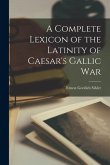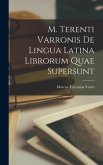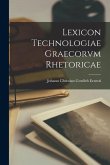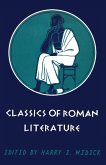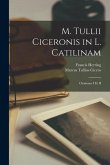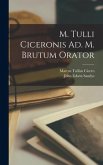Baroque Latinity
Studies in the Neo-Latin Literature of the European Baroque
Herausgeber: Glomski, Jacqueline; Xinyue, Bobby; Barton, William M; Taylor, Andrew; Harrison, Stephen; Manuwald, Gesine
Baroque Latinity
Studies in the Neo-Latin Literature of the European Baroque
Herausgeber: Glomski, Jacqueline; Xinyue, Bobby; Barton, William M; Taylor, Andrew; Harrison, Stephen; Manuwald, Gesine
- Broschiertes Buch
- Merkliste
- Auf die Merkliste
- Bewerten Bewerten
- Teilen
- Produkt teilen
- Produkterinnerung
- Produkterinnerung
"This volume addresses the idea of the Baroque in European literature in Latin. With contributions by scholars from various disciplines and countries, and by looking at a range of texts from across Europe, the volume offers case studies to deepen scholarly understanding of this important literary phenomenon and inspire future research"--
Andere Kunden interessierten sich auch für
![Livy Livy]() LivyLivy35,99 €
LivyLivy35,99 €![A Complete Lexicon of the Latinity of Caesar's Gallic War A Complete Lexicon of the Latinity of Caesar's Gallic War]() Ernest Gottlieb SihlerA Complete Lexicon of the Latinity of Caesar's Gallic War21,99 €
Ernest Gottlieb SihlerA Complete Lexicon of the Latinity of Caesar's Gallic War21,99 €![M. Terenti Varronis de Lingua Latina Librorum Quae Supersunt M. Terenti Varronis de Lingua Latina Librorum Quae Supersunt]() Marcus Terentius VarroM. Terenti Varronis de Lingua Latina Librorum Quae Supersunt40,99 €
Marcus Terentius VarroM. Terenti Varronis de Lingua Latina Librorum Quae Supersunt40,99 €![Lexicon Technologiae Graecorvm Rhetoricae Lexicon Technologiae Graecorvm Rhetoricae]() Johann Christian Gottlieb ErnestiLexicon Technologiae Graecorvm Rhetoricae29,99 €
Johann Christian Gottlieb ErnestiLexicon Technologiae Graecorvm Rhetoricae29,99 €![Classics of Roman Literature Classics of Roman Literature]() Harry WedeckClassics of Roman Literature40,99 €
Harry WedeckClassics of Roman Literature40,99 €![M. Tullii Ciceronis in L. Catilinam: Orationes I Et II M. Tullii Ciceronis in L. Catilinam: Orationes I Et II]() Marcus Tullius CiceroM. Tullii Ciceronis in L. Catilinam: Orationes I Et II23,99 €
Marcus Tullius CiceroM. Tullii Ciceronis in L. Catilinam: Orationes I Et II23,99 €![M. Tulli Ciceronis Ad. M. Brutum Orator M. Tulli Ciceronis Ad. M. Brutum Orator]() Marcus Tullius CiceroM. Tulli Ciceronis Ad. M. Brutum Orator40,99 €
Marcus Tullius CiceroM. Tulli Ciceronis Ad. M. Brutum Orator40,99 €-
-
-
"This volume addresses the idea of the Baroque in European literature in Latin. With contributions by scholars from various disciplines and countries, and by looking at a range of texts from across Europe, the volume offers case studies to deepen scholarly understanding of this important literary phenomenon and inspire future research"--
Hinweis: Dieser Artikel kann nur an eine deutsche Lieferadresse ausgeliefert werden.
Hinweis: Dieser Artikel kann nur an eine deutsche Lieferadresse ausgeliefert werden.
Produktdetails
- Produktdetails
- Verlag: Bloomsbury Academic
- Seitenzahl: 224
- Erscheinungstermin: 24. April 2025
- Englisch
- Abmessung: 234mm x 156mm x 25mm
- Gewicht: 454g
- ISBN-13: 9781350323476
- ISBN-10: 1350323470
- Artikelnr.: 70538358
- Herstellerkennzeichnung
- Libri GmbH
- Europaallee 1
- 36244 Bad Hersfeld
- gpsr@libri.de
- Verlag: Bloomsbury Academic
- Seitenzahl: 224
- Erscheinungstermin: 24. April 2025
- Englisch
- Abmessung: 234mm x 156mm x 25mm
- Gewicht: 454g
- ISBN-13: 9781350323476
- ISBN-10: 1350323470
- Artikelnr.: 70538358
- Herstellerkennzeichnung
- Libri GmbH
- Europaallee 1
- 36244 Bad Hersfeld
- gpsr@libri.de
Jacqueline Glomski is Honorary Senior Research Fellow at University College London, UK, Vice-President of the Society for Neo-Latin Studies (SNLS), and a fellow of the Royal Historical Society. She has co-edited the collected volumes Seventeenth-Century Libraries: Problems and Perspectives (forthcoming), Seventeenth-Century Fiction: Text and Transmission (2016), and Acta Conventus Neo-Latini Monasteriensis: Proceedings of the Fifteenth International Congress of Neo-Latin Studies (2015). Andrew Taylor is Senior Lecturer, Fellow and Director of Studies in English at Churchill College, University of Cambridge, UK. He has published widely on Renaissance literature and has edited Neo-Latin and Translation in the Renaissance (2014), The Early Modern Cultures of Neo-Latin Drama (2013), and Neo-Latin and the Pastoral (2006), the latter two both with Philip Ford. Gesine Manuwald is Professor of Latin at University College London, UK, and President of the Society for Neo-Latin Studies (SNLS). She has published a number of articles on early modern Latin literature and edited the collected volume Neo-Latin Poetry in the British Isles (Bloomsbury, 2012) with Luke Houghton.
List of contributors Preface 1 Introduction (Gesine Manuwald
UCL
UK and Andrew Taylor
Churchill College
Cambridge
UK) 2 The sixteenth century's revolution in rhetoric and its impact on the Baroque (Lucy R. Nicholas
Warburg Institute
UK) 3 The Greekness of Neo-Latin wit: Hermogenes and ingenuity in Julius Caesar Scaliger's Poetices libri septem (Javiera Lorenzini Raty
KCL
UK) 4 The triumph of the saint: St Casimir Jagiellon and the militant motifs in Baroque hagiographical poetry (Patryk Ryczkowski
Universität Innsbruck
Austria) 5 Innovation and fusion: Sarbiewski's theory of Baroque literary style (Tomas Riklius
Vilnius University
Lithuania) 6 Christ's blood or Mary's milk? 'Clarus Bonarscius'
Baroque piety and English Protestant outrage (Alison Shell
UCL
UK) 7 An example of Baroque Latinity through the inclusion of ancient literary models into modern thought: Claude-Barthélemy Morisot's Peruviana (1644) (Valérie Boutrois-Wampfler
University of Reims Champagne-Ardenne
France) 8 Maffeo Barberini's poems for the Farnese family in early Baroque Rome (Stephen J. Harrison
University of Oxford
UK) 9 Mannerisms in Latin Baroque poetry by Paul Fleming (1609-40) and Georg Gloger (1603-31) (Beate Hintzen
Universität Bonn
Germany) 10 What makes a Neo-Latin tragedy Baroque? (Jan Bloemendal
Royal Netherlands Academy/Huygens Institute
Netherlands and James Parente
University of Minnesota
USA) 11 Asses at the lyre: Latin as musical language and the benefits of exclusion (Eric Bianchi
Fordham University
USA) 12 Latin motet texts in seventeenth-century Rome and the Exercitia spiritualia of St Ignatius of Loyola (Adrian Horsewood
Royal Birmingham Conservatoire
UK) Index
UCL
UK and Andrew Taylor
Churchill College
Cambridge
UK) 2 The sixteenth century's revolution in rhetoric and its impact on the Baroque (Lucy R. Nicholas
Warburg Institute
UK) 3 The Greekness of Neo-Latin wit: Hermogenes and ingenuity in Julius Caesar Scaliger's Poetices libri septem (Javiera Lorenzini Raty
KCL
UK) 4 The triumph of the saint: St Casimir Jagiellon and the militant motifs in Baroque hagiographical poetry (Patryk Ryczkowski
Universität Innsbruck
Austria) 5 Innovation and fusion: Sarbiewski's theory of Baroque literary style (Tomas Riklius
Vilnius University
Lithuania) 6 Christ's blood or Mary's milk? 'Clarus Bonarscius'
Baroque piety and English Protestant outrage (Alison Shell
UCL
UK) 7 An example of Baroque Latinity through the inclusion of ancient literary models into modern thought: Claude-Barthélemy Morisot's Peruviana (1644) (Valérie Boutrois-Wampfler
University of Reims Champagne-Ardenne
France) 8 Maffeo Barberini's poems for the Farnese family in early Baroque Rome (Stephen J. Harrison
University of Oxford
UK) 9 Mannerisms in Latin Baroque poetry by Paul Fleming (1609-40) and Georg Gloger (1603-31) (Beate Hintzen
Universität Bonn
Germany) 10 What makes a Neo-Latin tragedy Baroque? (Jan Bloemendal
Royal Netherlands Academy/Huygens Institute
Netherlands and James Parente
University of Minnesota
USA) 11 Asses at the lyre: Latin as musical language and the benefits of exclusion (Eric Bianchi
Fordham University
USA) 12 Latin motet texts in seventeenth-century Rome and the Exercitia spiritualia of St Ignatius of Loyola (Adrian Horsewood
Royal Birmingham Conservatoire
UK) Index
List of contributors Preface 1 Introduction (Gesine Manuwald
UCL
UK and Andrew Taylor
Churchill College
Cambridge
UK) 2 The sixteenth century's revolution in rhetoric and its impact on the Baroque (Lucy R. Nicholas
Warburg Institute
UK) 3 The Greekness of Neo-Latin wit: Hermogenes and ingenuity in Julius Caesar Scaliger's Poetices libri septem (Javiera Lorenzini Raty
KCL
UK) 4 The triumph of the saint: St Casimir Jagiellon and the militant motifs in Baroque hagiographical poetry (Patryk Ryczkowski
Universität Innsbruck
Austria) 5 Innovation and fusion: Sarbiewski's theory of Baroque literary style (Tomas Riklius
Vilnius University
Lithuania) 6 Christ's blood or Mary's milk? 'Clarus Bonarscius'
Baroque piety and English Protestant outrage (Alison Shell
UCL
UK) 7 An example of Baroque Latinity through the inclusion of ancient literary models into modern thought: Claude-Barthélemy Morisot's Peruviana (1644) (Valérie Boutrois-Wampfler
University of Reims Champagne-Ardenne
France) 8 Maffeo Barberini's poems for the Farnese family in early Baroque Rome (Stephen J. Harrison
University of Oxford
UK) 9 Mannerisms in Latin Baroque poetry by Paul Fleming (1609-40) and Georg Gloger (1603-31) (Beate Hintzen
Universität Bonn
Germany) 10 What makes a Neo-Latin tragedy Baroque? (Jan Bloemendal
Royal Netherlands Academy/Huygens Institute
Netherlands and James Parente
University of Minnesota
USA) 11 Asses at the lyre: Latin as musical language and the benefits of exclusion (Eric Bianchi
Fordham University
USA) 12 Latin motet texts in seventeenth-century Rome and the Exercitia spiritualia of St Ignatius of Loyola (Adrian Horsewood
Royal Birmingham Conservatoire
UK) Index
UCL
UK and Andrew Taylor
Churchill College
Cambridge
UK) 2 The sixteenth century's revolution in rhetoric and its impact on the Baroque (Lucy R. Nicholas
Warburg Institute
UK) 3 The Greekness of Neo-Latin wit: Hermogenes and ingenuity in Julius Caesar Scaliger's Poetices libri septem (Javiera Lorenzini Raty
KCL
UK) 4 The triumph of the saint: St Casimir Jagiellon and the militant motifs in Baroque hagiographical poetry (Patryk Ryczkowski
Universität Innsbruck
Austria) 5 Innovation and fusion: Sarbiewski's theory of Baroque literary style (Tomas Riklius
Vilnius University
Lithuania) 6 Christ's blood or Mary's milk? 'Clarus Bonarscius'
Baroque piety and English Protestant outrage (Alison Shell
UCL
UK) 7 An example of Baroque Latinity through the inclusion of ancient literary models into modern thought: Claude-Barthélemy Morisot's Peruviana (1644) (Valérie Boutrois-Wampfler
University of Reims Champagne-Ardenne
France) 8 Maffeo Barberini's poems for the Farnese family in early Baroque Rome (Stephen J. Harrison
University of Oxford
UK) 9 Mannerisms in Latin Baroque poetry by Paul Fleming (1609-40) and Georg Gloger (1603-31) (Beate Hintzen
Universität Bonn
Germany) 10 What makes a Neo-Latin tragedy Baroque? (Jan Bloemendal
Royal Netherlands Academy/Huygens Institute
Netherlands and James Parente
University of Minnesota
USA) 11 Asses at the lyre: Latin as musical language and the benefits of exclusion (Eric Bianchi
Fordham University
USA) 12 Latin motet texts in seventeenth-century Rome and the Exercitia spiritualia of St Ignatius of Loyola (Adrian Horsewood
Royal Birmingham Conservatoire
UK) Index



